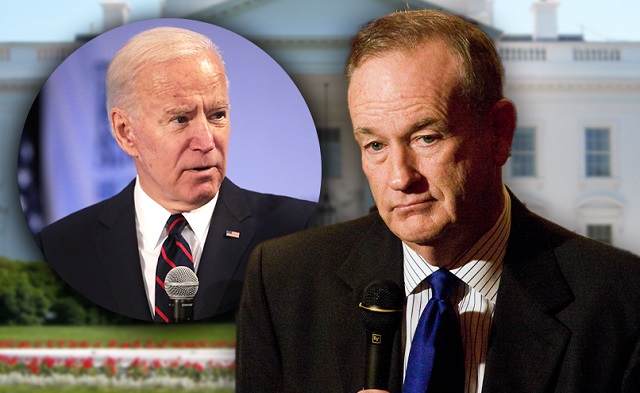International
Bill O’Reilly predicts Biden will drop out of presidential race ‘sometime soon’

From LifeSiteNews
Former Fox News star Bill O’Reilly predicted President Joe Biden will soon drop out of the race after a disastrous debate performance. Biden’s aides and liberal news outlets have also suggested the president should stop his re-election bid.
President Joe Biden will soon drop out of the 2024 presidential race, longtime conservative commentator Bill O’Reilly suggested recently.
“Expect this. Sometime soon, President Biden will step aside as President Johnson did in 1968. Vietnam got him. But first, the K Street Democrats in D.C. have to quietly float replacement names with the top liberal media moguls,” O’Reilly said on his website Monday. “Something as monumental as this is not done spontaneously. The liberal media and Hollywood money people will have input.”
“What is absolutely certain is that Joe Biden is finished as a powerful man,” O’Reilly added. “Shortly, he will have to go quietly into the night, pretty much dragging Jill Biden with him.”
🚨Here's a Biden update from https://t.co/rryWmyXe7C news headquarters. The decision has been made that the President will quit the campaign. Two reasons: Democrat internal polling says he cannot recover from the debate, and fundraising is drying up. (1/2) #JoeBiden
— Bill O'Reilly (@BillOReilly) June 30, 2024
O’Reilly, who was host for more than two decades of the popular The O’Reilly Factor on Fox News and now comments at his own website and for NewsNation, made the prediction following an underwhelming performance by Biden at last week’s debate against Donald Trump.
His prediction mirrors the desire and speculation of prominent liberal voices and outlets, including The New York Times editorial board, which urged Biden to drop out just one day after the presidential debate.
The board wrote:
He struggled to explain what he would accomplish in a second term. He struggled to respond to Mr. Trump’s provocations. He struggled to hold Mr. Trump accountable for his lies, his failures and his chilling plans. More than once, he struggled to make it to the end of a sentence.
Biden is currently engaged in a “reckless gamble,” according to the Times, because if he continues down this path, Trump will likely win.
“There are Democratic leaders better equipped to present clear, compelling and energetic alternatives to a second Trump presidency,” the editorial board argued. “There is no reason for the party to risk the stability and security of the country by forcing voters to choose between Mr. Trump’s deficiencies and those of Mr. Biden.”
“It’s too big a bet to simply hope Americans will overlook or discount Mr. Biden’s age and infirmity that they see with their own eyes,” according to the liberal newspaper.
After reiterating how much it despises Trump, the editorial pleaded with Democratic strategists to convince Biden to drop out of the race.
“Democrats who have deferred to Mr. Biden must now find the courage to speak plain truths to the party’s leader,” the editorial board wrote. “The confidants and aides who have encouraged the president’s candidacy and who sheltered him from unscripted appearances in public should recognize the damage to Mr. Biden’s standing and the unlikelihood that he can repair it.”
The entire New York Times homepage right now is 10 different articles trying to get Biden to drop out 😂 pic.twitter.com/nsM8eEaSJP
— Peter St Onge, Ph.D. (@profstonge) June 28, 2024
Biden has also lost the support of The Atlanta Journal-Constitution. Georgia is considered a swing state in the 2024 presidential election. “The 81-year-old president has shown a greater capacity to tell the truth than his opponent, former President Donald Trump,” the editorial board wrote on Saturday, June 29. “But the unfortunate truth is that Biden should withdraw from the race, for the good of the nation he has served so admirably for half a century.”
Some Democratic activists and aides have expressed concern about Biden in recent days.
“They’ve just been trying to skate to the general election with as minimal exposure as possible to the public. And now it’s blown up on them,” former Democratic National Committee delegate Thomas Kennedy told The Intercept. The news outlet reported that chances are low Biden will drop out of the race.
But concerns remain.
“Biden is toast,” one Democratic activist told Politico after the debate.
“In text messages with POLITICO, Democrats expressed confusion and concern as they watched the first minutes of the event,” the news outlet reported. “One former Biden White House and campaign aide called it ‘terrible,’ adding that they have had to ask themselves over and over: ‘What did he just say? This is crazy.’”
Some family members are blaming Biden aides for the president’s poor performance, according to a Sunday article in Politico. “First lady Jill Biden and his son Hunter Biden were the loudest voices urging the president to stay in the 2024 contest,” the outlet reported, based on unnamed sources.
Biden’s “cognitive health” remains an issue for many voters.
“For months before the first debate, the nation’s voters repeatedly expressed doubts over whether President Biden had the cognitive health enough to serve,” CBS News reported today. “Today, those doubts have grown even more: now at nearly three-quarters of the electorate, and now including many within his own party.”
Among registered voters, only 27 percent think Biden has the “mental & cognitive health to serve as president.” About 50% of registered voters, or twice as many, say Trump does.
The post-debate poll found in general, registered voters trusted Trump more. For example, 18 percent said Biden “inspired confidence,” while 44 percent said Trump did. Similarly, 21 percent said Biden “presented ideas clearly,” while 47 percent said Trump did.
The differences were not as large when it came to the question of a candidate’s ability to explain “plans & policies,” with 35 percent of respondents saying Biden did and 43 percent saying Trump did.
Among Democratic registered voters, 55 percent said he should continue running, while 45 percent said he should not.
The Democratic National Convention is scheduled for August 19 through the 22nd.
espionage
U.S. Charges Three More Chinese Scholars in Wuhan Bio-Smuggling Case, Citing Pattern of Foreign Exploitation in American Research Labs

Federal prosecutors allege visiting researchers at the University of Michigan’s “Xu Lab” conspired to import undeclared biological materials from Wuhan.
Federal prosecutors have charged three additional Chinese research scholars connected to the so-called “Xu Lab” at the University of Michigan with conspiring to smuggle biological materials from Wuhan and making false statements — the latest in a string of national security cases involving suspicious research activity at the university’s Life Sciences Institute.
Named in a newly filed criminal complaint are Xu Bai, 28, and Fengfan Zhang, 27, who face conspiracy counts, and Zhiyong Zhang, 30, who is accused of making false statements. All three held student exchange visas and worked in the lab of Xianzhong “Shawn” Xu, according to the Justice Department. Chengxuan Han, a Chinese citizen who also worked in Xu’s lab, previously pleaded no contest in the related roundworm smuggling case.
According to the complaint, in 2024 and 2025 Bai and Fengfan Zhang received multiple shipments containing concealed biological materials related to roundworms that had been sent from China by Han, a doctoral student at Huazhong University of Science and Technology in Wuhan. The case accelerated when Han traveled to work in the Xu Lab in June 2025. She was questioned at the border and allegedly evaded searches by wiping her phone and concealing biological material.
“At some point, pattern becomes practice. And, apparently, these three men are part of a long and alarming pattern of criminal activities committed by Chinese nationals under the cover of the University of Michigan,” U.S. Attorney Jerome F. Gorgon Jr. said. “This is a threat to our collective security.”
As the Federal Bureau of Investigation counterintelligence case takes shape, the alleged facts resemble a much more serious episode that occurred before the COVID-19 pandemic at Canada’s most secure pathogen research lab in Winnipeg. In that case, according to Canadian intelligence reports, Chinese international students working under Chinese Canadian scientist Xiangguo Qiu were found to be clandestinely importing and exporting biological materials and secretly using the high-security facility for research connected to People’s Liberation Army biological weapons and vaccine programs, including Ebola and bat filovirus studies at the Wuhan Institute of Virology.
Earlier this year, the Justice Department accused two other China-linked researchers, Zunyong Liu and Yunqing Jian, of smuggling Fusarium graminearum — a crop pathogen cited in scientific literature as a potential agricultural terror agent — into the United States for University of Michigan-related research. Their communications referenced shipping biological materials and research plans. Both face smuggling and related charges.
In the new Michigan case, prosecutors allege multiple packages of concealed biological material related to nematode roundworms were shipped from China in 2024 and 2025 by a doctoral student in Wuhan and received by University of Michigan-affiliated scholars. The Justice Department says Han, the prior shipper, pleaded no contest to smuggling and false statement charges this summer before being removed from the United States.
After Han’s removal and an internal university probe into the Xu Lab, the three defendants were terminated for refusing to attend a mandatory meeting, according to the indictment. Investigators say the men then bought tickets to leave from Detroit on Oct. 20, rebooked for Oct. 15, and ultimately attempted to fly out of John F. Kennedy International Airport at 2 a.m. on Oct. 16. During a customs inspection, one defendant allegedly made false statements about Han, while two others admitted receiving packages from her, including after her arrest.
Shawn Xu, who runs the X.Z. Shawn Xu Laboratory, is not charged. From Ann Arbor, Michigan Live reported that federal investigators have not searched Xu, according to his attorney David Nacht.
Xu “has lived in the United States for decades,” Nacht told Michigan Live, adding that Xu studies worms sourced domestically that are not used for commercial purposes.
In the earlier case, Han admitted sending concealed biological materials to University of Michigan recipients. Although the materials were not considered harmful, prosecutors said the shipments violated import and labeling laws.
A Justice Department press release attributed sharp warnings to senior officials about the misuse of academic pathways. “Educational institutions must enhance their admissions procedures to prevent exploitation,” an acting Immigration and Customs Enforcement director said.
“The Chinese nationals charged allegedly were involved in smuggling biological materials into the U.S. on several occasions,” FBI director Kash Patel said. “The FBI and our partners are committed to defending the homeland and stopping any illegal smuggling into our country.”
The Bureau is a reader-supported publication.
To receive new posts and support my work, consider becoming a free or paid subscriber.
Daily Caller
UN Chief Rages Against Dying Of Climate Alarm Light


From the Daily Caller News Foundation
The light of the global climate alarm movement has faded throughout 2025, as even narrative-pushing luminaries like Bill Gates have begun admitting. But that doesn’t mean the bitter clingers to the net-zero by 2050 dogma will go away quietly. No one serves more ably as the poster child of this resistance to reality than U.N. chief Antonio Guterres, who is preparing to host the UN’s annual climate conference, COP30, in Brazil on Nov. 10.
In a speech on Monday, Guterres echoed poet Dylan Thomas’s advice to aging men and women in his famed poem, “Do not go gentle into that good night:”
Do not go gentle into that good night,
Old age should burn and rave at close of day;
Rage, rage against the dying of the light.
Dear Readers:
As a nonprofit, we are dependent on the generosity of our readers.
Please consider making a small donation of any amount here.
Thank you!
Though wise men at their end know dark is right,
Because their words had forked no lightning they
Do not go gentle into that good night.
Seeing that his own words have “forked no lightning,” Guterres raged, raged against the dying of the climate alarm light.
“Governments must arrive at the upcoming COP30 meeting in Brazil with concrete plans to slash their own emissions over the next decade while also delivering climate justice to those on the front lines of a crisis they did little to cause,” Guterres demanded, adding, “Just look at Jamaica.”
Yes, because, as everyone must assuredly know, the Earth has never produced major hurricanes in the past, so it must be the all-powerful climate change bogeyman that produced this major storm at the end of an unusually slow Atlantic hurricane season.
Actually, Guterres’ order to all national governments to arrive in Belem, Brazil outfitted with aspirational plans to meet the net-zero illusion, which everyone knows can and will never be met, helps explain why President Donald Trump will not be sending an official U.S. delegation. Trump has repeatedly made clear – most recently during his September speech before the U.N. General Assembly – that he views the entire climate change agenda as a huge scam. Why waste taxpayer money in pursuit of a fantasy when he’s had so much success pursuing a more productive agenda via direct negotiations with national leaders around the world?
“The Green New Scam would have killed America if President Trump had not been elected to implement his commonsense energy agenda…focused on utilizing the liquid gold under our feet to strengthen our grid stability and drive down costs for American families and businesses,” Taylor Rogers, a White House spokeswoman, said in a statement to the Guardian. “President Trump will not jeopardize our country’s economic and national security to pursue vague climate goals that are killing other countries,” she added.
The Guardian claims that Rogers’s use of the word “scam” refers to the Green New Deal policies pursued by Joe Biden. But that’s only part of it: The President views the entire net-zero project as a global scam designed to support a variety of wealth redistribution schemes and give momentum to the increasingly authoritarian forms of government we currently see cracking down in formerly free democracies like the U.K., Canada, Germany, France, Australia and other western developed nations.
Trump’s focused efforts on reversing vast swaths of Biden’s destructive agenda is undoing 16 years of command-and-control regulatory schemes implemented by the federal government. The resulting elimination of Inflation Reduction Act subsidies is already slowing the growth of the electric vehicles industry and impacting the rise of wind and solar generation as well.
But the impacts are international, too, as developing nations across the world shift direction to be able to do business with the world’s most powerful economy and developed nations in Europe and elsewhere grudgingly strive to remain competitive. Gates provided a clear wake-up call highlighting this global trend with his sudden departure from climate alarmist orthodoxy and its dogmatic narratives with his shift in rhetoric and planned investments laid out in last week’s long blog post.
Guterres, as the titular leader of the climate movement’s center of globalist messaging, sees his perch under assault and responded with a rhetorical effort to reassert his authority. We can expect the secretary general to keep raging as his influence wanes and he is replaced by someone whose own words might fork some lightning.
David Blackmon is an energy writer and consultant based in Texas. He spent 40 years in the oil and gas business, where he specialized in public policy and communications.
-

 Censorship Industrial Complex2 days ago
Censorship Industrial Complex2 days agoHow the UK and Canada Are Leading the West’s Descent into Digital Authoritarianism
-

 Business2 days ago
Business2 days agoCapital Flight Signals No Confidence In Carney’s Agenda
-

 International2 days ago
International2 days agoThe capital of capitalism elects a socialist mayor
-

 Energy1 day ago
Energy1 day agoEby should put up, shut up, or pay up
-

 Business2 days ago
Business2 days agoPulling back the curtain on the Carney government’s first budget
-

 Daily Caller1 day ago
Daily Caller1 day agoUS Eating Canada’s Lunch While Liberals Stall – Trump Admin Announces Record-Shattering Energy Report
-

 Business1 day ago
Business1 day agoThe Liberal budget is a massive FAILURE: Former Liberal Cabinet Member Dan McTeague
-

 Business1 day ago
Business1 day agoCarney’s budget spares tax status of Canadian churches, pro-life groups after backlash








